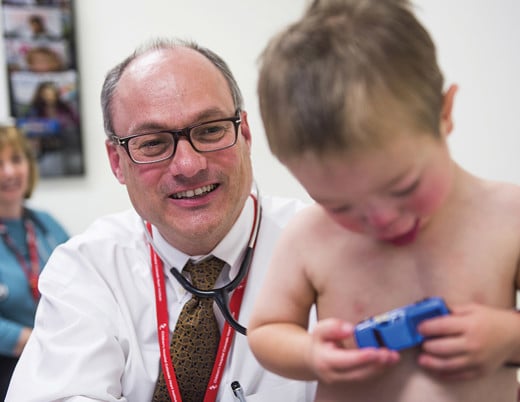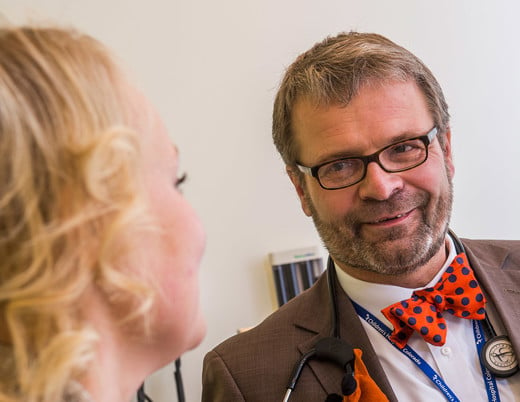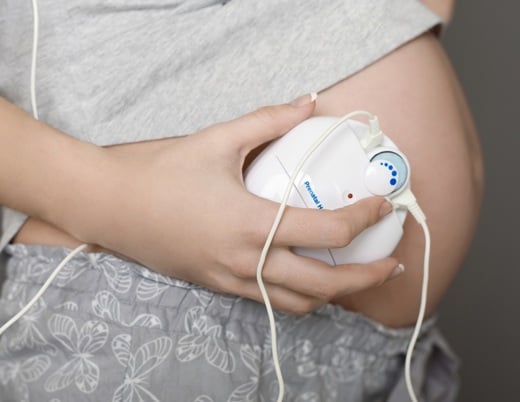Although Children's Hospital Colorado is a pediatric hospital, we're specially equipped to treat adults who were born with certain medical conditions. One example is congenital heart disease, which is known as adult congenital heart disease (ACHD) in patients over age 18. About 1.2 million American adults are now living with ACHD.
Congenital heart disease refers to several abnormalities in the heart's structure that can affect the function of the heart. With advances in diagnosis and treatment, more and more people who are born with heart defects are now living into adulthood.
Adults with congenital heart disease can experience signs and symptoms later in life, even after being treated as children. In simple cases, patients may have no symptoms, but complex ACHD can cause life-threatening complications.
Patients with ACHD require lifelong medical care to ensure they have the best quality of life and heart health. In Colorado, an estimated 12,000 to 15,000 people live with ACHD and aren’t receiving appropriate treatment. In 2018, ACHD nurse care coordinators at Children's Colorado set out to find some of those patients and fill the gaps in their care.
Disappearing ACHD patients
Our Heart Institute treats patients with ACHD ages 12 and up through our Adult Congenital Heart Disease Program.
The only one of its kind in the state, our Program is a partnership with the University of Colorado Hospital. This specialized team includes seven physicians, a nurse practitioner, three nurse care coordinators, a social worker and a psychologist.
Over the decade since the Program launched, the team noticed many patients had gaps in care with cardiologists once they reached adulthood. Some patients transitioned to adult-focused care providers at the University of Colorado Hospital, but many others simply stopped returning for visits.
Meanwhile, the Program added specialists who could perform interventions through our Cardiac Catheterization Program, allowing them to treat even more patients. That was good news for patients and families, but it presented a challenge for the team.
"Thanks to research, technology and surgical options, we're treating congenital heart disease more effectively," explains nurse care coordinator Molly Wallrich. "The overall incidence of babies born with this condition is about 1%, which hasn't changed, but the adult population of people with ACHD continues to grow."
To better serve that growing population – and to keep more adult CHD patients coming back for follow-up – Children's Colorado needed to increase its ability to track and care for patients in the long term.
The power of outreach
Nurse care coordinators at Children's Colorado first turned to their existing patient database. Over six months, they performed a retrospective review of these records, including dates each patient was last seen and recommended follow-up intervals.
The team audited 466 patients and pinpointed 60 who were at least six months overdue for follow-up visits. Then the team began an outreach blitz, starting with three phone call attempts to each person.
The team mailed letters to patients who didn't return calls, educating them on the need for follow-up visits. In all, 40 people responded to these outreach efforts and returned to care.
"Knowing that those 40 patients are receiving the care they need makes this effort well worth it," says nurse care coordinator Lisette Rome. "The project also underscores the importance of educating patients in adolescence about the importance of regular, on-time follow-up, which has always been our focus."
Plugging patients into care
On that front, the ACHD team is deepening its commitment to supporting patients during key transitional periods.
"We start losing patients between ages 17 and 25, when they go to college or move away from home," says Rome. "If we can begin building up their health literacy at age 12, they'll be better prepared to manage this lifelong condition."
ACHD can contribute to anxiety or depression, so the team also provides access to mental health providers, including our Program's psychologist.
"Some of our patients have three surgeries before they're 2 years old,” Wallrich says. "They deal with a lot, and they appreciate having somebody who understands what they're going through."
Before this outreach effort, adult patients in the Program typically transferred to the University of Colorado Hospital for ongoing treatment. Now, we can also provide diagnostic and treatment services, including minimally invasive procedures, for patients of all ages and stages of ACHD.
Doctors evaluate each patient on an individual basis and determine the most appropriate place for their care. For example, our congenital heart surgeons and interventional cardiologists may decide to treat some patients with comorbidities at the University of Colorado Hospital rather than at Children's Colorado.
Expanding care for ACHD
The team's findings hold good lessons for providers treating adult patients with other congenital defects, such as neurological and gastrointestinal conditions.
Rome's and Wallrich's work is already receiving national recognition. They received the Cardiac Care Associate Research Award at the 29th International Symposium on Congenital Heart Disease in the Adult. And they aren't stopping there.
"Our Program has made many strides in expanding care for adults with congenital heart disease, but based on the population of Colorado and the incidence of ACHD, we still have a lot of work to do," says Wallrich. "We want to give every patient the specialized care they need to manage ACHD and enjoy a long, healthy life."





 720-777-0123
720-777-0123










